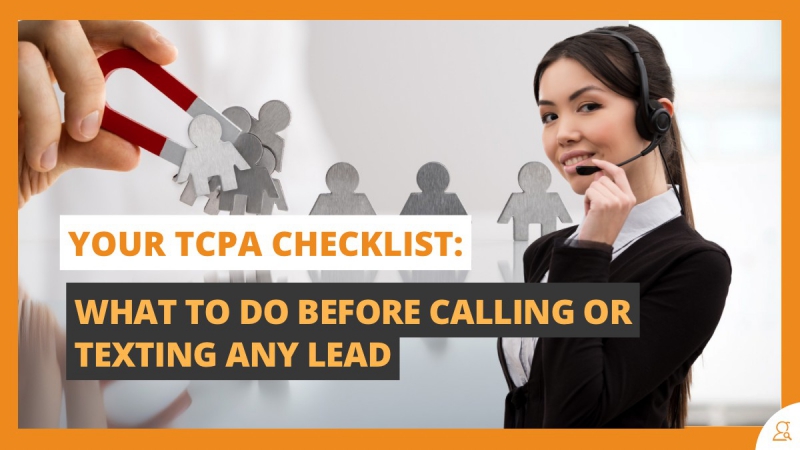12
Your TCPA Checklist: What to Do Before Calling or Texting Any Lead
If you reach out to leads via phone call or text message, you need a TCPA checklist. The Telephone Consumer Protection Act (TCPA) is one of the most important consumer protection laws affecting sales, marketing, and lead generation. It governs how businesses can contact individuals by phone, text message, or prerecorded voice message.
Failing to comply can be very expensive. Fines can range from $500 to $1,500 per violation. Multiply that by hundreds or thousands of calls, and a single compliance slip can become financially devastating.
Fortunately, with the right checklist and processes, staying compliant is very achievable. This article will walk you through what to do before calling any lead so you can connect with prospects confidently and legally.
Understand the TCPA Basics
The TCPA was passed in 1991 to protect consumers from intrusive telemarketing practices. This includes unwanted robocalls and texts, calls made using an autodialer without consent, calls or messages to numbers on the National Do Not Call (DNC) Registry, and prerecorded messages sent without proper disclosure.
The TCP applies to landlines (especially residential), mobile phones, text messages, and faxes (yes, they’re still covered!). Enforcement is handled by the Federal Communications Commission (FCC) and Federal Trade Commission (FTC), but consumers themselves can also sue under the law.
Pay Attention to Real-World Examples of TCPA Fines
Many businesses underestimate the TCPA until they see the costs in action. In 2013, Papa John’s settled for $16.5 million over text marketing without proper consent. In 2015, Time Warner Cable was ordered to pay $229,500 to one customer for 153 autodialed calls after she told them to stop. And in 2017 Dish Network was fined $280 million for calling consumers on the DNC list.
Even big brands with compliance teams get it wrong. The key takeaway is that every call or text is a legal event, so treat it that way.
Confirm Consent First
The type of consent required depends on the kind of communication:
Prior Express Consent
Prior express consent is required for manual calls to cell phones for informational purposes. Express consent can be verbal, but make sure it’s documented for protection.
Prior Express Written Consent
Prior express written consent is required for autodialed or prerecorded marketing calls to cell phones and for text marketing. Express written consent must include a clear disclosure that the person is agreeing to receive calls or texts using an autodialer/prerecorded message and that consent is not a condition of purchase. Electronic signatures and checkbox forms are valid if properly documented.
It’s important to pay attention to what doesn’t count as express consent. For example, pre-checked boxes, buried fine print, and consent obtained indirectly without disclosure do not meet the express written consent requirement.
Scrub Against Do Not Call Lists
Two key lists must be checked before calling:
The National Do Not Call Registry is managed by the FTC. It is recommended that numbers be checked against this list at least every 31 days. You should also maintain your own record of people who have asked you specifically not to call. Keep this list permanently.
If you have an established business relationship, however, you can sometimes call a number even if it is on the national list. But you can never call it if they’ve opted out with you directly.
Verify Time Zone and Legal Calling Hours
TCPA allows calls only between 8:00 a.m. and 9:00 p.m. in the lead’s local time zone. It sounds straightforward, but this can be challenging for a number of reasons.
First, area codes don’t always match the actual location of the owner. This is especially common with mobile numbers. You might also have leads in states with different daylight saving rules. Furthermore, individual states have their own additional restrictions. To avoid these challenges, use software that checks real-time location data before placing a call.
Identify Yourself Clearly
TCPA requires honest and transparent caller identification. To meet these guidelines, be sure to state your name, company name, and purpose within the first few seconds. Provide a callback number or address if asked. And never use false caller ID or “spoofing” to disguise your identity.
Have an Opt-Out Process Ready
Consumers can revoke consent at any time, in any reasonable way. This might look like verbally telling a caller to stop, texting “STOP” or “UNSUBSCRIBE,” or sending an email or even a social media message in some cases.
When this happens, it is your responsibility to honor opt-outs within 30 days if not immediately. Update both your national scrub process and your internal DNC list.
Document Everything
Recordkeeping is your best legal defense. Keep proof of consent including the date, time, method, and copy of form or recording. Retain call logs with dates, times, and outcomes. And record opt-outs and dates numbers are removed from lists. It’s also a good idea to store TCPA-related records for at least 4 years to match the statute of limitations for most claims.
Follow Special Rules for Text Messaging
Texts are considered “calls” under the TCPA, so the same rules apply. For example, you must have prior express written consent for marketing texts. Include clear opt-out instructions in every message, something like, “Reply STOP to unsubscribe”. And keep opt-out requests in your records and stop sending messages immediately.
Watch Out for State “Mini-TCPA” Laws
Several states have their own stricter rules. Florida’s Telephone Solicitation Act (FTSA), for example, expands TCPA restrictions in that state as does Oklahoma’s Telephone Solicitation Act of 2022. Washington places extra limitations on caller ID display and robocalls as well. If you’re calling nationwide, follow the most restrictive rules that could apply to your leads.
Maintain Compliance Through Training
Even the best checklist won’t work if your team isn’t trained. Provide TCPA training for all sales, marketing, and customer service reps. Use call scripts that include required disclosures. Review recordings for compliance. Finally, consider a compliance pledge for new hires to sign, confirming they understand TCPA rules.
Risk Management Tips
Use reliable CRM tools that track consent, call logs, and DNC scrubs automatically. Consider TCPA defense insurance if your volume is high or risk is significant. Audit your processes quarterly to catch issues early.
Final Pre-Call TCPA Checklist
And now, the moment you’ve been waiting for: the pre-call TCPA checklist. Before calling or texting any lead, ask:
Do I have the right type of consent for this call or text?
Has this number been scrubbed against the National and Internal DNC lists?
Is it between 8 a.m. and 9 p.m. in their local time zone?
Am I prepared to identify myself and my company clearly?
Do I have an immediate opt-out process ready?
Will this call be documented in our records?
If all six boxes are checked, you can call or text with confidence.
How to Achieve a Complete TCPA Checklist
If you can’t check all six boxes, what then? Fortunately, there are tools you can use to assist you as you evaluate and scrub numbers.
Searchbug’s phone validation API, for example, simultaneously checks whether a number is on the DNC list and flags TCPA risk, such as invalid or restricted numbers. This makes pre-call compliance quick and efficient without guessing whether a number is safe to call. It even offers the state and time zone associated with the number so that you can better determine when it is safe to call.
Searchbug also offers an API service that provides access to the FCC Reassigned Numbers Database (RND). On January 27, 2021 all service providers were required to start maintaining records of disconnected numbers. By submitting a phone number and the last date of consent to contact the consumer, you can quickly determine if the number has been reassigned or disconnected after that date to know whether it is safe to call.
The TCPA isn’t just red tape—it’s a serious consumer protection law. By understanding consent requirements, respecting calling hours, honoring opt-outs, and documenting everything, you can turn compliance from a legal burden into a competitive advantage. Searchbug can help.
If you’re building TCPA compliance into your calling workflow, Searchbug offers the key tools you need: real-time DNC and TCPA checks, lead validation via public records, and a flexible pricing model. Together, this helps ensure you’re contacting only the right, allowed leads without breaking the bank. Try one or more of our APIs with free test credits and complete your TCPA checklist today!











